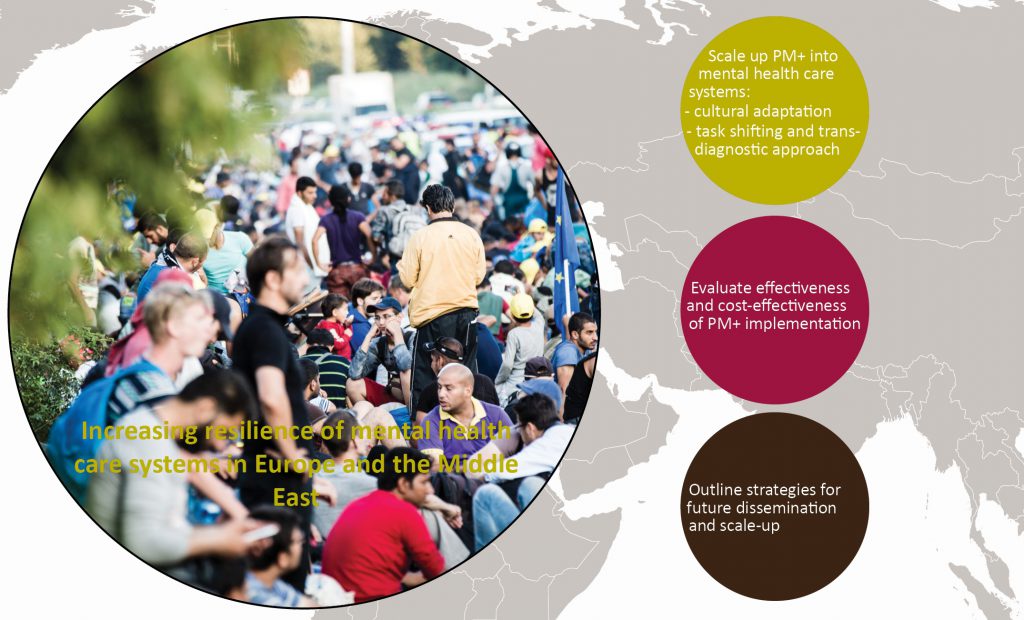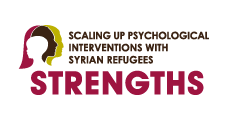PROJECT PLAN
The STRENGTHS project is organised in eight Work Packages. The work packages are small sub-projects which together make up the entire project. The project commenced in January 2017 and ran for six years, ending on 31 December 2022.
The STRENGTHS project has five main objectives:
WP1: Management and overall coordination
Objectives:
1: To efficiently manage and coordinate STRENGTHS so that the objectives in the other WPs can be achieved.
2: To communicate with and report to the European Commission.
3: To oversee ethics approval and safe data management across all WPs
WP leader: VU University Amsterdam
WP2: Health Systems Evaluation
Objectives:
1: To analyse the responsiveness of health systems across European host countries and LAMIC bordering Syria in addressing the mental health care needs of refugees.
2: To examine how contextual factors such as socio-economic, cultural, and political-economy factors influence the responsiveness of health systems to the mental health care needs of refugees in the project countries.
3: To explore how the scaling-up of the low-intensity PM+ programmes can support health system responsiveness to the mental health care needs of refugees in the project countries
4: To compare the responsiveness before and after implementation of the PM+ programmes of the health systems of European and LAMI countries bordering Syria
WP leader: London School of Hygiene and Tropical Medicine
WP 3: Adaptation
Objectives:
1: To culturally adapt the evidence based PM+ programmes within health systems of the participating European and LAMIC bordering Syria
2: To develop and evaluate training protocols for implementation of the prioritized PM+ programmes in co-creation with end-users.
3: To conduct high-quality training of trainers in the PM+ manuals in preparation for the implementation phase
WP leader: Danish Red Cross
WP4: Refugee Settlement and Camp Implementation
Objectives:
The overarching goal of this work package is development of scalable low-intensity interventions that can enhance the mental health of refugees in settlements in countries surrounding Syria. This work package will adapt, integrate, and evaluate PM+ for health services in Jordan and Lebanon who are dealing with the needs of Syrian refugees. Specifically, the objectives of this work package are:
1: To assess the specific needs of stakeholders and end-users for the implementation of the low intensity programmes for refugee settlements in Jordan and Lebanon.
2: To identify barriers and facilitators specific to the chosen refugee settings that affected successful implementation (process evaluation).
3: To evaluate the capacity of the adapted PM+ to improve the mental health of adult and child Syrian refugees in Jordan and Lebanon when it is implemented in a local health delivery service.
4: To test the implementation, sustainability, acceptability, and effectiveness of the PM+ programs when implemented in refugee camps
WP leader: University of New South Wales
WP5: Community implementation
Objectives:
The overall aim of this work package is implement scaling-up of the evidence based PM+ programmes successfully within community settings the Netherlands, Turkey and Switzerland in in terms of health-system performance, effectiveness, affordability and sustainability within health systems and identify barriers and facilitators to this end. Specifically, the objectives of this work package are:
1: To assess the specific needs of stakeholders and end-users for the implementation of the low intensity programmes for refugee settlements in Jordan and Lebanon.
2:To identify barriers and facilitators specific to the chosen refugee settings that affected successful implementation (process evaluation).
3: To evaluate the capacity of the adapted PM+ to improve the mental health of adult and child Syrian refugees in Jordan and Lebanon when it is implemented in a local health delivery service.
4: To test the implementation, sustainability, acceptability, and effectiveness of the PM+ programs when implemented in refugee camps.
WP leader: VU University of Amsterdam
WP6: Online implementation
Objectives: This work package will implement the evidence based PM+ programme by creating an online and offline computer- and smartphone based version for Syrian refugees. The overall aim is to evaluate the dissemination of a generic electronic version (ePM+) as a scaling-up strategy in Germany, Sweden and Egypt by assessing health-system performance, effectiveness, affordability, sustainability within health systems as well as barriers and facilitators to this end.
1: To create and host a sustainable open-source software version of the PM+ programme with contact on demand support for Syrian refugees.
2: To assess the needs of stakeholders and end-users for the implementation and scaling-up of ePM+ in Germany, Sweden and Egypt.
3: To implement and scale-up ePM+ within the health care provision for Syrian refugees in Germany, Sweden and Egypt.
4: To evaluate implementation of scaling-up of ePM+ in terms of service provider-related outcomes and beneficiary-related outcomes.
5: To identify barriers and facilitators specific to the chosen refugee settings that affected successful scaling-up and implementation of ePM+ (process evaluation).
WP leader: Freie Universität Berlin
WP7: Economic and Implementation Evaluation
Objectives:
1: To identify, monitor and quantify all organisational and resource requirements to help facilitate the implementation of PM+ in different contexts in Europe and countries bordering Syria
2: To estimate the economic costs of the implementation process and identify key economic levers to help facilitate implementation
3: To determine the potential cost effectiveness (from the health system, public purse and societal perspectives) of the low-intensity PM+ programmes observed in 6 implementation studies
4: To model the potential economic costs and benefits of investing in implementation mechanisms to aid in the scaling up of access to PM+ in different contexts in Europe and countries bordering Syria
5: To model interactions between intervention and refugee characteristics, and intervention outcomes both within and across the range of low-intensity interventions.
WP leader: London School of Economics
WP8: Synthesis and Dissemination
Objectives:
1: To identify and engage new organisations, beneficiaries and individuals (beyond those participating in the implementation of project) who may be interested in integrating the intervention in their routine activities and contribute to scaling up of the intervention
2: To assess the needs and requirements for successful dissemination of the future the dissemination of the low-intensity PM+ programmes, and to assess needs for future programmes to be developed and evaluated
3: To disseminate and promote ‘buy-in’ of a validated framework and strategy for large-scale implementation to providers of health and social services, as well as policy makers, , and funding agencies: a) Validate and disseminate the culturally and contextually adapted PM+ training manuals developed in WP3 for implementation for large scale dissemination through the UN agencies (WHO, UNHCR), the Red Cross Movement and other partners; b. Validate and disseminate the cultural and contextual adaptation manual used for implementation for large scale dissemination through the WHO, UNHCR, the Red Cross Movement and other partners; c. Establish a sustainable STRENGTHS training network for delivering training in PM+ programmes beyond the duration of the project hosted by existing networks for mental health and psychosocial support and psychological trauma-care;
Develop and disseminate PM+ financing packages for dissemination to relevant stakeholders within health systems including estimates of resources needs and benefits (for the organization and for the participants) to be expected when implementing PM+.
4: To disseminate the results of the implementation of the PM+ low-intensity programmes within the scientific community, among all identified stakeholders, and the wider public.
WP leader: The United Nations High Commissioner for Refugees
WP9: Ethics requirements
Objectives: Ensure project implementation is in compliance with the ethics requirements
WP leader: VU University of Amsterdam



